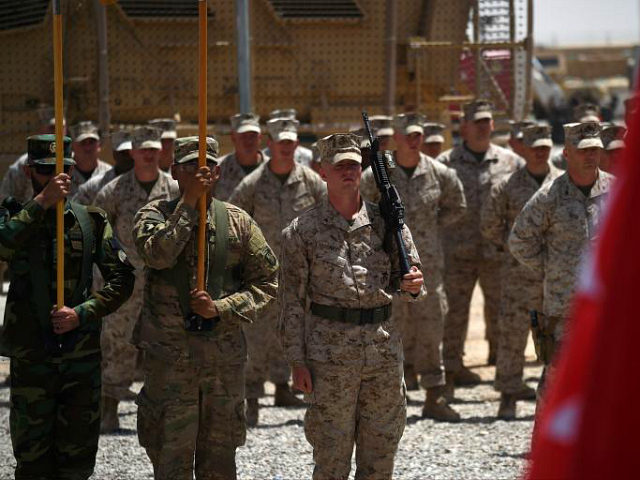Afghan news outlets, citing CNN, reported Tuesday that the administration of President Joe Biden would soon deploy another 650 troops to Afghanistan, where Biden expanded the U.S. presence through at least September in an order this month.
Afghanistan’s Khaama Press and Pajhwok Afghan News reported the alleged troop number increase as meant to protect American forces as they withdraw. CNN claimed the news originated with “several defense officials,” none of whom went on the record.
“The deployment was approved by Defense Secretary Lloyd Austin late last week as part of a package of military assets being sent to the country to facilitate the US withdrawal, which is due to be complete by September 11,” CNN alleged.
Former President Donald Trump arranged an agreement with the Taliban, which the United States has been fighting in Afghanistan for two decades, last year that would have resulted in a full American troop withdrawal from Afghanistan by May 1. The deal required the Taliban to cut ties to foreign terrorist groups like al-Qaeda and no longer attack American forces. Biden broke the deal this month, disregarding Trump’s May 1 deadline and claiming all American forces would leave by September 11, the 20th anniversary of the jihadist attacks on the U.S. homeland that prompted the Afghanistan invasion.
The Taliban denounced Biden’s breach of the agreement and asserted their jihadists now had no reason to abide by their vow not to attack American forces between May and September.
According to Khaama Press, citing some American sources, the Pentagon has attempted to increase its forces in the region to ensure the security of troops departing, allegedly, by September. This includes requests for the deployment of an aircraft carrier in the region that could allow for swift air attacks on the Taliban if necessary. Voice of America independently reported Monday that the Pentagon had moved two B-52 bombers to Qatar meant to provide “air cover for the approximately 10,000 U.S. and NATO forces set to depart Afghanistan over the coming months.”
Voice of America quoted the Pentagon’s press secretary, John Kirby, telling reporters that the withdrawal from Afghanistan would occur only after a military buildup: “I think you can expect there will be an addition of posture in Afghanistan.”
Biden announced in mid-April that he would postpone America’s withdrawal from Afghanistan because “it’s time for American troops to come home,” leaving open the question of why he allowed the already established deadline for withdrawal to expire without pulling America’s remaining troops in the country out. Biden’s announcement was followed by effusive assurances from Secretary of State Antony Blinken that America would remain a prominent presence in Afghanistan after the troop withdrawal through civilian diplomatic efforts. Blinken visited Kabul and met with Afghan President Ashraf Ghani the day after Biden’s announcement.
“The reason I’m here … is to demonstrate literally, by our presence, that we have an enduring and ongoing commitment to Afghanistan,” Blinken said at a press conference in the Afghan capital. “Even when our troops come home, our partnership with Afghanistan will continue.”
Last week, Blinken announced that Biden would invest “nearly $300 million” in American taxpayers’ dollars in the immediate future.
“As part of our commitment to invest in and support the Afghan people, we are working with Congress to provide nearly $300 million in additional civilian assistance for Afghanistan in 2021 from both the Department of State and the United States Agency for International Development,” Blinken said on Twitter. “This assistance, which we announced at the quadrennial donors’ conference in November 2020 as potentially being available at a future date, is being made available now to demonstrate our enduring support for the Afghan people.”
The U.S., Blinken added, had designated the money for “improving access to essential services for Afghan citizens, fighting corruption and narcotics, promoting economic growth, improving health and educational services, supporting women’s empowerment, facilitating human rights, strengthening Afghan civil society and independent media.”
Adding to assurances that America would loom large in Afghanistan despite the withdrawal, the head of the Pentagon’s Central Command, Gen. Kenneth F. McKenzie, Jr., told the House of Representatives last week that troops leaving Afghanistan may not “come home,” as Biden had suggested. As the U.S. would still need to engage in “counter-terrorism operations” in the country, negotiations were underway with neighboring countries to ensure an American troop presence there, he said, which would allow for “targeted raids” and other operations. Reports suggested following McKenzie’s remarks that Tajikistan, Kazakhstan, and Uzbekistan may be prime locations for an enhanced American military presence after September.
Afghanistan borders America’s greatest rival and national security threat, China.
McKenzie also stated last week that he believed it was possible for the Afghan military to collapse in its entirety without U.S. support.
“I am concerned about the ability of the Afghan military to hold on after we leave, the ability of the Afghan Air Force to fly, in particular, after we remove the support for those aircraft,” McKenzie told the Senate. “If we don’t provide them some support, they certainly will collapse.”
The delayed withdrawal has “encouraged armed and extremist groups in the region and world,” Afghanistan’s Tolo News reported Tuesday, citing Afghan “analysts.” One comment from an Afghan lawmaker, Mohammad Hassan Sharifi Balkhabi, speculated that suggesting an Afghan-style withdrawal anywhere else is “a serious threat and will have a negative consequence.”
The Taliban appears to have increased its attacks on Afghan security forces, though not against U.S. troops, since Biden announced he would remain in the country for an extra four months. Civilian attacks have also increased in frequency. One such attack killed at least 16 children at a religious ceremony on Monday.

COMMENTS
Please let us know if you're having issues with commenting.